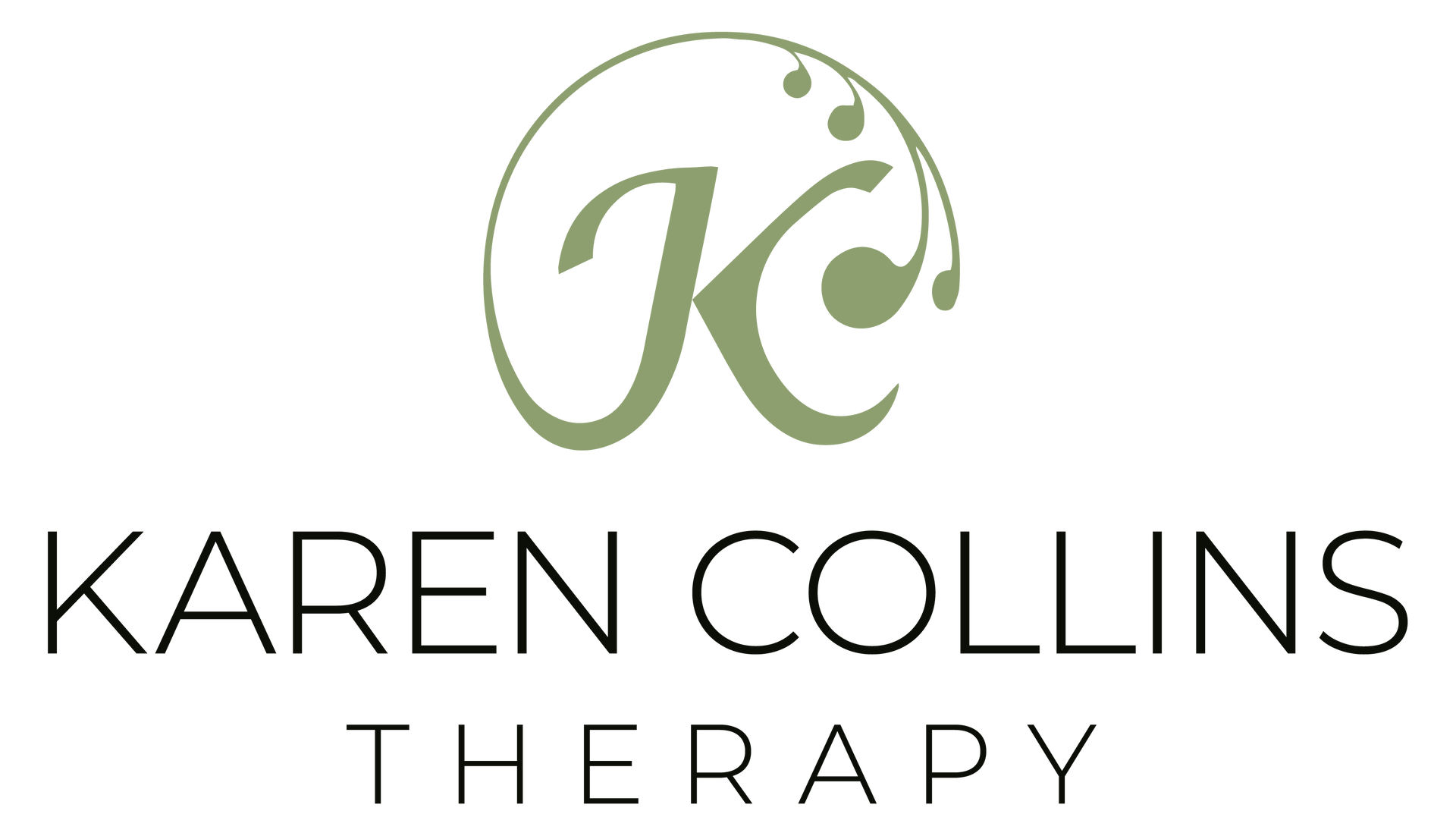You Can't Positive Vibes Your Way Out of Trauma
Introduction
If you've experienced trauma, you've probably heard it before: "Just think positive thoughts!" or "Good vibes only!" While these suggestions come from caring people, they can actually make you feel worse. When you're struggling with the effects of a traumatic experience, being told to simply change your mindset can feel dismissive of your real pain.
I'm Karen Collins, a therapist in Petaluma who specializes in trauma therapy and attachment work. After over 18 years of helping people heal from childhood trauma and other traumatic experiences, I want you to know something important: you can't positive vibes your way out of trauma. Your healing journey requires much more than positive thinking alone.
In this article, you'll discover why trauma affects your brain and body in ways that positive vibes can't fix, and what actually helps people heal from traumatic memories and experiences.
Article Outline
- Why Positive Thinking Alone Won't Heal Trauma
- How Trauma Actually Affects Your Brain and Body
- The Problem with "Just Think Positively" Advice
- What Your Nervous System Needs to Feel Safe
- Real Ways to Begin Healing from Trauma
- Why Trauma-Informed Therapy Makes a Difference
- When Positive Mindset Can Actually Help (And When It Can't)
- Building a Support System That Actually Understands
- Grounding Techniques That Work Better Than Positive Vibes
- How to Find Professional Help for Trauma
- Moving Forward: What Real Healing Looks Like
- Taking the First Step Toward Genuine Recovery
Why Positive Thinking Alone Won't Heal Trauma
When you've experienced trauma, your brain and body remember what happened even when you try to think positively. Trauma doesn't live in your thoughts alone, it gets stored in your nervous system, creating real physical and emotional responses that positive vibes simply can't override.
Think about it this way: if you broke your leg, no amount of positive thinking would heal the bone. You'd need proper medical care, time to rest, and maybe physical therapy. Trauma works similarly. It creates real changes in how your brain and body function, and healing requires specific approaches that address these changes.
Many people with trauma feel frustrated when positive thinking doesn't work. They might think they're doing something wrong or that they're not trying hard enough. But the truth is, trauma isn't something you can think your way out of. It requires understanding, patience, and often professional support to truly heal.
How Trauma Actually Affects Your Brain and Body
When you experience a traumatic event, your brain's alarm system gets activated. This system is designed to keep you safe, but trauma can cause it to stay "on" even when the danger has passed. Your nervous system might react as if you're still in danger, even in safe situations.
This is why you might have a racing heart when you're perfectly safe, or why certain smells, sounds, or situations can trigger a flashback. Your brain and body are trying to protect you, but they're responding to past danger rather than present reality.
Trauma affects how your brain processes memories and emotions. It can make it hard to feel safe in the present moment, even when you logically know you're okay. This isn't something you can simply think away, it's a real change in how your nervous system functions.
The Problem with "Just Think Positively" Advice
When someone tells you to "just think positively" about your trauma, it can feel like they're dismissing your experience. It suggests that your pain isn't real or that you're choosing to feel bad. This kind of advice can actually increase shame and guilt, making you feel like you're failing at healing.
Positive thinking can also lead to suppression of difficult emotions. When you try to get rid of negative thoughts and feelings, you might actually be preventing yourself from processing what you've been through. Healing from trauma often requires feeling and working through difficult emotions, not avoiding them.
The pressure to maintain positive vibes can be exhausting when you're dealing with trauma. It takes tremendous energy to put on a happy face when you're struggling inside. This kind of emotional performance can actually slow down your healing process.
What Your Nervous System Needs to Feel Safe
Your nervous system needs to learn that it's safe now. This happens through consistent, gentle experiences that help your brain and body understand that the trauma is over. It's not about thinking your way to safety, it's about creating real experiences of safety.
This might mean finding ways to feel grounded in your body, like deep breathing or gentle movement. It could involve creating routines that help you feel secure, or building relationships with people who make you feel truly safe and understood.
Your nervous system also needs time to process what happened. This processing often happens in therapy, where you can work through traumatic memories with professional support. It's not about reliving the trauma, but about helping your brain file these memories in a way that doesn't keep triggering your alarm system.
Real Ways to Begin Healing from Trauma
Real trauma healing starts with understanding what trauma actually is and how it affects you. It's not about getting rid of all difficult feelings, but about learning to work with them in healthy ways. Here are some approaches that actually help:
Talk therapy with a trauma-informed therapist can help you process what happened and develop healthy coping mechanisms. Therapies like EMDR are specifically designed to help your brain process traumatic memories in a way that reduces their power to trigger you.
Somatic experiencing focuses on how trauma gets stored in your body. This approach helps you learn to notice body sensations and gradually release the physical tension that trauma creates. It's about helping your nervous system complete responses that got stuck during the traumatic event.
Building a strong support system is crucial for healing. This means finding people who understand trauma and can hold space for your experience without judgment. It's not about surrounding yourself with people who only offer positive vibes, but finding those who can sit with you in your pain.
Why Trauma-Informed Therapy Makes a Difference
Trauma-informed therapy recognizes that trauma affects every part of your life. A trauma-informed therapist understands that your symptoms aren't character flaws - they're normal responses to abnormal experiences. This approach focuses on safety, choice, and collaboration rather than pushing you to "get over it."
In trauma-informed therapy, you won't be told to just think positively or reframe your experience. Instead, you'll work with a therapist who understands how trauma affects your brain and body. They'll help you develop real tools for managing symptoms and processing difficult memories.
As a therapist in Petaluma who uses trauma-informed approaches, I've seen how powerful this kind of therapy can be. People don't need to be fixed - they need to be understood and supported as they heal at their own pace.
When Positive Mindset Can Actually Help (And When It Can't)
There is a place for positive thinking in trauma recovery, but it's not where most people think. A positive mindset can be helpful after you've done the deeper work of processing trauma and learning to regulate your nervous system.
Once you've built a foundation of safety and developed healthy coping mechanisms, positive thinking can help you continue moving forward. But trying to use positivity as your primary tool for healing trauma is like trying to paint over a crack in the foundation - it might look better temporarily, but it won't fix the underlying problem.
The key is timing and balance. Positive thinking works best when it's built on a foundation of real healing, not when it's used to suppress or avoid difficult emotions and experiences.
Building a Support System That Actually Understands
Finding people who truly understand trauma can be challenging, but it's essential for healing. Look for friends, family members, or support groups who can listen without trying to fix you or offer quick solutions. You need people who can sit with you in your pain without rushing you to feel better.
A good support system includes people who respect your healing journey and don't pressure you to "move on" before you're ready. They understand that healing from trauma takes time and that there's no set timeline for recovery.
Professional support is often a crucial part of this system. A trauma-informed therapist can provide the specialized understanding and tools you need to heal. Don't hesitate to reach out for professional help, it's a sign of strength, not weakness.
Grounding Techniques That Work Better Than Positive Vibes
When you're triggered or feeling overwhelmed, grounding techniques can help you feel more present and safe. These techniques work with your nervous system rather than against it, helping you find stability in the moment.
Simple grounding exercises include focusing on your breath, noticing five things you can see around you, or feeling your feet on the ground. These techniques help bring you back to the present moment without requiring you to think positively about your trauma.
Progressive muscle relaxation can help release physical tension that trauma creates in your body. This isn't about positive thinking, it's about helping your body remember what it feels like to be relaxed and safe.
How to Find Professional Help for Trauma
If you're ready to seek professional help for trauma, look for therapists who specialize in trauma work and use evidence-based approaches. Here in Petaluma and throughout Sonoma County, there are therapists trained in trauma-informed care who can help you heal.
Don't be afraid to ask potential therapists about their experience with trauma and their approach to treatment. A good trauma therapist will be happy to explain how they work and what you can expect from therapy.
Remember that finding the right therapist is important. You need someone who feels safe to you and who understands your specific needs. It's okay to meet with a few different therapists before deciding who to work with.
Moving Forward: What Real Healing Looks Like
Real healing from trauma doesn't mean you'll never think about what happened or never feel sad or angry about it. Healing means that traumatic memories lose their power to completely overwhelm you. It means you can think about what happened without your nervous system going into full alarm mode.
Healing also means developing a different relationship with difficult emotions. Instead of trying to get rid of them or think them away, you learn to feel them without being consumed by them. You develop the capacity to grieve what you've lost while also building a meaningful life.
The goal isn't to become someone who never struggles or who maintains positive vibes all the time. The goal is to become someone who can hold both pain and joy, who can acknowledge their trauma while also living fully in the present.
Taking the First Step Toward Genuine Recovery
If you're tired of trying to positive-vibe your way through trauma, know that real help is available. Healing is possible, but it requires the right support and approaches. You don't have to figure this out alone, and you don't have to keep pretending that positive thinking is enough.
Consider reaching out to a trauma-informed therapist who can help you understand what you're experiencing and develop real tools for healing. Look for support groups where you can connect with others who understand your journey.
Remember that seeking help is a sign of strength and self-care. You deserve support that truly understands trauma and offers real pathways to healing.
Summary: Key Takeaways
• Trauma affects your brain and body in ways that positive thinking alone can't fix
• Your nervous system needs real experiences of safety, not just positive thoughts
• Healing requires processing difficult emotions, not suppressing them with positivity
• Trauma-informed therapy offers specialized approaches that actually work
• Building a support system that understands trauma is crucial for recovery
• Grounding techniques work better than positive vibes for managing triggers
• Real healing takes time and doesn't require maintaining constant positivity
Ready to Begin Real Healing?
If you're ready to move beyond positive vibes and start genuine trauma healing, I'm here to help. As a trauma-informed therapist in Petaluma, I understand that healing requires more than positive thinking. I offer a safe, non-judgmental space where you can work through your experiences at your own pace.
Contact Karen Collins Therapy today to schedule your first appointment.












